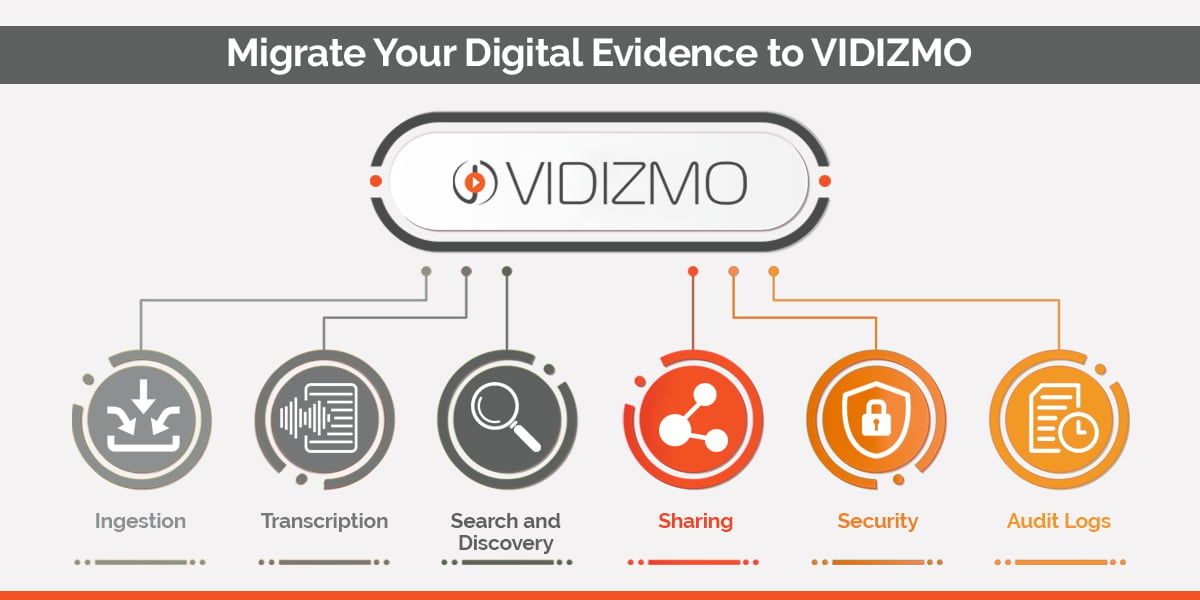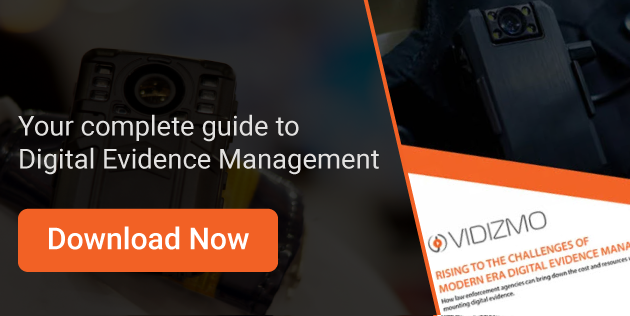According to a report by Motion Picture Association of America, global sales of video disc formats (including DVD) were $25.2 billion in 2014 but only $13.1bn in 2018. That is a drop in the ballpark of 50 percent.
However, some law enforcement agencies still manage digital evidence in discs, burning digital evidence to DVDs, CDs, and other types of disc storage for submission and storage by evidence custodian.
When needed by prosecutors, investigators, or the defense, evidence in these discs need to be pulled, copied, and refiled multiple times. Sometimes, misplaced discs even need to be replaced.
Furthermore, according to the office of the Secretary of State, local law enforcement agencies need to retain evidence for homicides (unsolved), missing persons (not found), and unidentified bodies for up to 75 years after the case opened, and in the case of misdemeanors (without fingerprints) until the offender attains 99 years of age or until the offender is deceased, whichever occurs sooner.

But retaining digital evidence for such long periods is no easy feat. Officers spend hours on their desks managing, indexing, and making the evidence searchable in a centralized location.
In addition to the laborious management, which involves searching and transcribing the relevant digital evidence, storage of such digital evidence in local, disparate discs is neither forensically sound nor permanent.
How can a prosecutor prove that no one tampered with the evidence or that the disc was an exact copy of the original?
Also, discs such as DVD’s deteriorate after a while, so the evidence cannot be retained, even though the disc is there.
Law enforcement agencies will fare much better if they leverage an intelligent digital evidence management system to take care of all these problems.
How does VIDIZMO resolve these challenges?
VIDIZMO Digital Evidence Management System (DEMS) offers a centralized solution to all the aforementioned challenges faced by law enforcement agencies to upload and manage digital evidence once the evidence are digitized while also providing comprehensive digital evidence ingestion, easy transcription, powerful search and discovery, extensive sharing, robust security, accurate audit logs, and multiple deployment options.
Ingestion
VIDIZMO’s DEM ingests digital evidence from all formats and sources once digitized: such as DVDs, CCTV cameras, phone recordings, images, docs, body-worn cameras, dash cams, interview rooms cameras, and many others.
VIDIZMO also ingests metadata associated the evidence to enhance search and discovery of digital evidence and can be configured to ingest thousands of hours of video with relevant metadata to index the evidence and make it searchable.
Transcription
VIDIZMO provides machine-generated automatic transcription as well as a human transcription for accuracy, which converts spoken words into searchable and indexable text, thereby speeding up evidence processing, in-video search, and retrieval.
Search and discovery
Evidence migrated from discs, and other types of storage need to be made searchable.
Once uploaded, VIDIZMO provides a robust platform for search of digital evidences within the platform through categories, tags, custom attributes (user-defined, and system-generated), and metadata generated from various sources such as Artificial Intelligence.
Furthermore, for evidence such as videos, VIDIZMO provides a search inside the video that makes finding information as easy as searching for content in an email or document.
Evidence library grows due to electronic evidence being gathered from multiple sources such as the officer to whom the case is assigned, the officer who first responded to the incident, eyewitnesses, and even experts who are consulted for the case.
VIDIZMO DEM allows a thorough and detailed search of all digital evidence in the DEM system using metadata such as DME title, case number, lead investigator, annotations, description, tags, author or even by custom attributes such as publishing date, evidence type, evidence upload date, department, evidence locality, or any other required identifiers.
Sharing
Due to evidence pouring from a multitude of digital sources, there is a vast amount of digital sharing amongst law enforcement agencies that work collaboratively to solve cases.
These stakeholders include, but are not limited to, County Sheriff, Police Departments, District Attorneys, Defense Attorneys, Public Defender, juries, and judges- all of whom are involved in the process sharing digital evidence for legal investigations.
For instance, when a district attorney opens a case for investigation, the law enforcement agencies involved are required to share evidence with the DA’s office within a specific time frame. These evidence are then shared with judges and juries for trail and other courtroom procedures. Sharing digital evidence is, therefore, integral to the legal process.
VIDIZMO Digital Evidence Management System addresses this by allowing straightforward content sharing with internal and external (third party) users by generating a link and password protecting evidence.
These features enable investigators to share digital evidence with specific viewers (internally or externally) or groups. Admins have the option to make evidence available by email or specifying viewers and groups for a particular time frame by entering details such as hour, minute, beginning, and ending date of the digital evidence to be shared.
Security
VIDIZMO provides a secure role-based access control system, authorized via single sign-on integration, provides complete user and content segregation based on user roles defined within the system – all of which protect the system from any form of intrusion, unauthorized account access, data exposure, or evidence tampering.
Also, VIDIZMO offers complete control over all user actions and content access rights through its built-in Role-Based Access Control (RBAC), where users are grouped into various roles, either manually or via an automatic active directory synchronization process.
Furthermore, admins can implement security policies at the portal level and assign specific security policies to each evidence uploaded.
Audit Logs
Public prosecutors must show that digital evidence presented is authentic and has not been tampered. At the same time, investigators need to perform a high-value analysis of the digital evidence to find information that proves the guilt or innocence of the suspect in court of law.
An audit trail shows how, by whom, from where the evidence was handled- all in line with the chain of custody protocols to maintain the integrity of digital evidence.
VIDIZMO audit logs provide information such as an event, IP address from where the event occurred, the user who initiated the event, description of the event, date and time, and other relevant details. The system logs all activity — an audit trail report displays which, what, when, and where files have been accessed.
What deployment options does VIDIZMO provide?
VIDIZMO also provides the option for secure content storage, either on-premises or on any customer-owned cloud. However, VIDIZMO offers its government and law enforcement customers the opportunity to leverage public cloud providers such as Microsoft Azure or Amazon Web Services (AWS) Government Cloud.
These options give customers the flexibility to architect secure cloud solutions that comply with the Criminal Justice Information System (CJIS), FedRAMP High baseline, U.S. International Traffic in Arms Regulations (ITAR); Export Administration Regulations (EAR); Department of Defense (DoD) Cloud Computing Security Requirements Guide (SRG) for Impact Levels 2, 4 and 5; FIPS 140-2; IRS-1075; and other compliance regimes.
These types of cloud providers help customers address compliance at every stage of their cloud journey.
VIDIZMO customers can also employ a hybrid cloud solution where data can be stored in the cloud and on-premises. Such would be an ideal solution for agencies looking to avail the best cloud economics, while also leveraging existing on-premises infrastructures to lower total cost of operations.
A cloud and on-premises storage combination, determined depending on retention periods, could result in significant storage cost differentials.
For instance, hybrid cloud storage can be utilized for non-evidentiary videos with shorter retention periods, while evidentiary footage with more stringent regulations and more extended retention policies can be stored on-premises.
VIDIZMO is also available on Azure and AWS Marketplace.

Posted by VIDIZMO Team
We at VIDIZMO are experts in secure and compliant video streaming and digital evidence management. Our aim is to help educate such that you can better utilize your video data.





